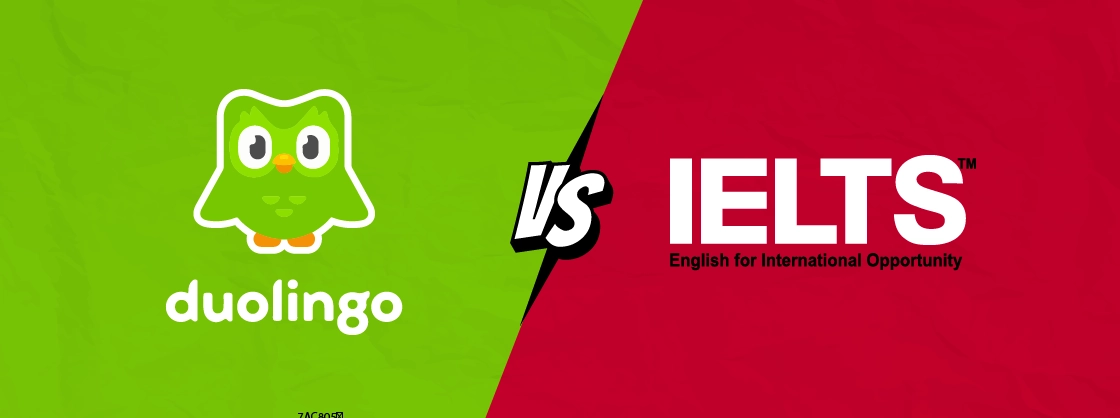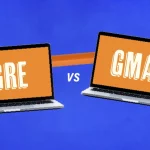Duolingo vs IELTS: Which One Should You Take?
Table of Contents
Studying abroad is such an exciting journey, but it comes with some big decisions. One of the first ones? Picking the right English test. If you’re torn between IELTS (International English Language Testing System) and the Duolingo English Test (DET), don’t worry—you’re not alone.
IELTS has been around for years and is trusted by universities everywhere. On the other hand, Duolingo is shaking things up with its quick, affordable, at-home testing option. Pretty appealing, right?
Here’s the thing: there’s no “one size fits all” when it comes to these tests. It’s all about what works best for you. Do you like detailed, structured tests like IELTS, or does the simple, modern style of Duolingo sound like a better fit? Let’s break it down together and figure out which test is your perfect match.
IELTS and Duolingo- Key differences
Duolingo and IELTS are two prominent exams that are used for assessing and improving English language skills, but they serve very different purposes. While IELTS has long been a standard for academic and immigration purposes, Duolingo offers a modern, accessible alternative. Understanding their differences is crucial to making an informed decision.
Here’s a detailed comparison between Duolingo and IELTS exam:
| Aspect | Duolingo English Test (DET) | International English Language Testing System (IELTS) |
| Developer/Administrator | Duolingo | British Council, IDP: IELTS Australia, and Cambridge Assessment English |
| Purpose | Assesses English language proficiency for academic admissions and other purposes | Evaluates English language proficiency for academic, professional, and immigration purposes |
| Format | Fully online, computer-adaptive test; can be taken at home | Available in paper-based and computer-delivered formats; conducted at designated test centers |
| Structure | Adaptive test section and a video interview | Four sections: Listening, Reading, Writing, and Speaking |
| Duration | Approximately 1 hour | Approximately 2 hours and 45 minutes |
| Scoring | Scale from 10 to 160 | Band scale from 0 to 9 |
| Fees | $49 USD | Varies by country; typically ranges from $150 to $200 USD |
| Validity Period | 2 years | 2 years |
| Difficulty Level | Adaptive difficulty; generally considered accessible | Standardized difficulty; may be perceived as more challenging due to comprehensive sections |
| Result Declaration | Results available within 48 hours | Results available 13 days after the test |
Points to be Considered:
- Test Environment: DET offers the convenience of being taken from home, while IELTS requires attendance at a test center.
- Acceptance: IELTS is widely accepted globally across various institutions and for immigration purposes. DET is gaining acceptance, particularly among academic institutions, but it’s essential to verify if your target institution recognizes it.
- Test Content: IELTS assesses all four language skills comprehensively. DET focuses on integrated skills through an adaptive format.
Choosing between DET and IELTS depends on your specific needs, the requirements of your chosen institutions, and your personal test-taking preferences.
Test Format: IELTS vs DET
When choosing between DET and IELTS English proficiency tests, understanding the structure of each exam is crucial. Both tests assess English proficiency across similar skills but vary in how these skills are tested. Here’s a detailed comparison of Duolingo English Test and IELTS Exam formats to help you make an informed choice:
| Aspect | IELTS | Duolingo English Test (DET) |
| Versions | Academic (for higher education/professional registration) and General Training (for migration/workplace). | Single version suitable for all purposes. |
| Sections | Listening, Reading, Writing, Speaking. | Adaptive Test and Video Interview. |
| Listening | – Four recordings with 10 questions each. – Focuses on conversations and monologues. | Integrated listening tasks through various question types like identifying spoken words and phrases. |
| Reading | – Three passages ranging from descriptive to analytical. – Questions include multiple-choice, matching, and short answers. | Adaptive questions assessing comprehension, grammar, and vocabulary through short and long passages. |
| Writing | – Task 1: Write a 150-word essay describing visual data (graph, chart, etc.). – Task 2: Write a 250-word formal essay. | Integrated tasks like sentence completion, short responses, and a short essay prompt. |
| Speaking | – Conducted in-person or via video call with a trained examiner. – Structured as a short interview, speech, and discussion. | – Video Interview Section: Candidates respond to prompts by recording answers into the computer’s microphone. |
| Test Structure | – Divided into four sections: – Listening: 40 questions in 30 minutes. – Reading: 40 questions in 60 minutes. – Writing: 2 tasks in 60 minutes. – Speaking: Interview (11–14 minutes). | – Adaptive Section: Multiple-choice questions that adjust difficulty based on responses. – Video Interview Section: Recorded video answers. |
| Duration | Approximately 2 hours and 45 minutes (including Speaking test conducted separately). | Approximately 1 hour. |
| Format | Paper-based or computer-delivered. | Fully online and computer based. |
| Scoring | Band scale of 0–9. | Scale of 10–160. |
IELTS vs DET- Score comparison
The scoring systems for the IELTS and Duolingo English Test (DET) are designed differently to measure English proficiency. IELTS scores each section (Listening, Reading, Writing, and Speaking) on a scale of 0 to 9, with the overall band score being the average of these four scores. Duolingo uses a single proficiency score ranging from 10 to 160, providing a comprehensive evaluation of language skills.
Here’s a verified comparison table to correlate IELTS band scores with Duolingo scores:
| IELTS Band Score | Duolingo (DET) Score |
| 8.5 – 9 | 160 |
| 8 | 155 – 150 |
| 7.5 | 145 – 140 |
| 7 | 135 – 130 |
| 6.5 | 125 – 120 |
| 6 | 115 – 105 |
| 5.5 | 100 – 95 |
| 5 | 90 – 80 |
| 4.5 | 75 – 65 |
| 0 – 4 | 10 – 60 |
Should I take the IELTS or DET?
Deciding between the IELTS and the Duolingo English Test (DET) depends on your specific goals and circumstances. Here’s a breakdown to guide your choice:
Choose IELTS if:
- Application to Top-Tier Universities or Immigration: IELTS is widely recognized by prestigious institutions and immigration authorities globally.
- Preference for Structured, In-Person Testing: IELTS offers a traditional exam setting, which some test-takers find beneficial.
Choose Duolingo English Test (DET) if:
- Need for Quick Results and Cost-Effectiveness: DET provides rapid results, typically within 48 hours, and is more affordable than IELTS.
- Acceptance by Target Institutions: Ensure that the institutions you’re applying to accept DET scores, as its recognition, while growing, is not as universal as IELTS.
Which test is easier: IELTS or DET?
The perceived difficulty varies based on individual strengths:
- Duolingo English Test (DET): Features a fast-paced, adaptive format that adjusts question difficulty in real-time, which may benefit those comfortable with integrated skills and quick thinking.
- IELTS: Offers a detailed, traditional format with separate sections for Listening, Reading, Writing, and Speaking, appealing to those who excel in structured environments.
IELTS vs DET Exam: Pros and Cons
When deciding between the IELTS and the Duolingo English Test (DET), it’s essential to weigh the pros and cons of each exam based on your goals and circumstances. Both tests have distinct advantages and limitations, from convenience and cost to test duration and format. While IELTS is a globally recognized gold standard for English proficiency, offering comprehensive evaluations with face-to-face speaking components, DET is a newer, fully online option that’s budget-friendly and delivers results quickly. Here’s a side-by-side comparison to help you choose the best fit for your academic or professional journey:
| Aspect | IELTS Pros | IELTS Cons | DET Pros | DET Cons |
| Convenience | Globally recognized; available in numerous test centers worldwide. | Requires in-person attendance; limited test dates. | Fully online; flexible scheduling; can be taken from home. | Limited acceptance compared to IELTS; requires a reliable internet connection and specific technical requirements. |
| Cost | Widely trusted by universities and employers; comprehensive assessment. | More expensive than DET; additional costs for rescheduling or extra score reports. | More affordable; includes unlimited score reports at no extra cost. | May not be suitable for high-stakes purposes; some institutions may not accept DET scores. |
| Test Duration | Comprehensive evaluation of all language skills; face-to-face speaking component. | Lengthier test duration (approximately 2 hours and 45 minutes). | Shorter test duration (about 1 hour); quick results (within 48 hours). | Lacks in-depth testing compared to IELTS; no face-to-face interaction, which some may find less personal. |
Conclusion
When choosing between Duolingo vs IELTS, consider your study goals, target institutions, and personal preferences. IELTS remains the gold standard for its global acceptance and in-depth testing, while Duolingo shines for its convenience and affordability. Both tests are excellent tools to showcase your English proficiency; the choice ultimately depends on which aligns better with your aspirations.
Frequently Asked Questions
What is the main difference between IELTS and Duolingo?
IELTS is a traditional, globally recognized test, while Duolingo is an online, affordable alternative designed for convenience.
Is Duolingo easier than IELTS?
It depends on the individual. Duolingo is shorter and adaptive, while IELTS requires in-depth preparation for structured sections.
Which test is more widely accepted: Duolingo or IELTS?
IELTS is accepted by over 11,000 institutions, whereas Duolingo is accepted by more than 4,000.
What is the cost difference between IELTS and Duolingo?
IELTS costs around $250, whereas Duolingo costs $59, making it a budget-friendly option.
Can Duolingo replace IELTS for visa purposes?
In most cases, IELTS is preferred for visa applications, as Duolingo is not universally accepted for immigration.







